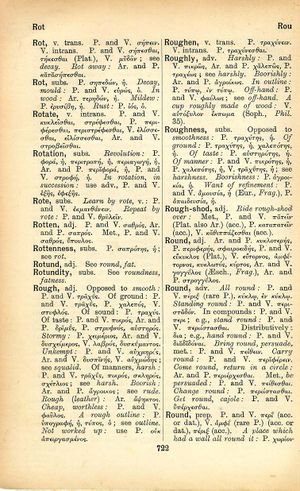rot
Ὡς πάντα τιμῆς ἐστι πλὴν τρόπου κακοῦ → Ut cuncta nunc sunt cara, nisi mores mali → Charakterlosigkeit allein bleibt ohne Ehr
English > Greek (Woodhouse)
verb transitive
verb intransitive
P. and V. σήπεσθαι, τήκεσθαι (Plato), V. μυδᾶν; see decay.
rot away: Ar. and P. κατασήπεσθαι.
substantive
decay, mould: P. and V. εὐρώς, ὁ.
German > Latin
rot, ruber (blutrot). – rufus (lichtrot, fuchsrot). – rutĭlus (feuergelb oder -rot; goldgelb oder gelbrot). – rubicundus (hochrot, ein starkes, glühendes Rot zeigend). – rubidus (dunkelrot). – purpureus (purpurfarbig, blutfarben u. hochrot mit sanftem Glanz). – miniaceus (mennigrot). – etwas rot, subruber; subrufus; subrubicundus, rubicundulus. – r. im Gesicht, rubicundus. rubicundo ore (von Natur oder von vielem Trinken etc.); pudore od. rubore suffusus (vor Scham errötet). – r. werden, rubescere (eig.); im Gesicht, s. erröten. – r. machen, r. färben, rufare. rutilum reddere (fuchsrot); fucare (purpurrot); cocco tingere (scharlachrot); miniare (mennigrot): r. sein, rubēre (auch vor Scham, z.B. über und über, totis genis).

